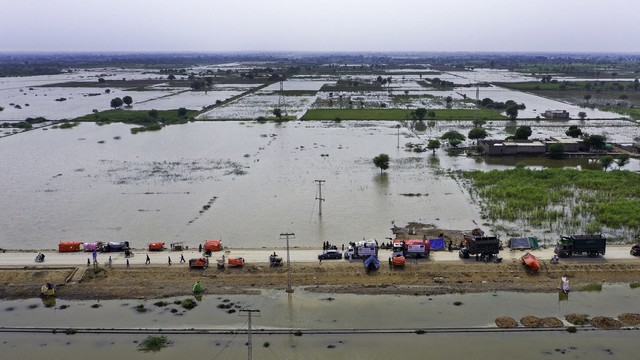Message to Secretary of State John Kerry: a legally binding treaty in Paris is essential
In response to comments from the US Secretary of State, Achala Abeysinghe sets out nine key reasons why the Paris climate agreement must be legally binding.


US Secretary of State John Kerry, pictured with chairperson of the African Union, Abdel Aziz, is opposing African countries' desire for a legally binding agreement at COP21 (via Google Images licence)
The United States Secretary of State John Kerry has told the Financial Times that the outcome from the UNFCCC summit in Paris (COP21) "definitively" would not be a treaty (subscription required).
Perhaps, as France suggested, Mr Kerry was confused. Or maybe he was misunderstood?
Whatever the reason behind it, such a statement coming from such a high level within the US administration risks creating a bad vibe in the current process. For many of the countries involved, a legally-binding agreement is essential.
Technically-speaking, according to the Vienna convention on the law of treaties (PDF), 'treaty' means an international agreement concluded between states in written form and governed by international law, whether embodied in a single instrument, or in two or more related instruments and whatever its particular designation.
Such agreements may set forth mutual principles, objectives, rules and commitments that are binding between the concerned parties. The binding force of agreements is represented by the principle of pacta sunt servanda, meaning that "agreements must be kept".
In practice, the name of the agreement does not matter as long as it falls within the parameters of international law. What is crucial is to have legally-binding obligations and provisions for compliance and enforcement within an international agreement that must be ratified by countries.
Of course, countries are under no obligation to accept and ratify such international agreements. It is also possible that such agreement will gather limited ratification by the parties, thus failing to be implemented and achievement its objective.
However, the UNFCCC negotiations have been gathering momentum for a legally binding agreement for the past four years.
Below are my top nine reasons why a legally-binding international agreement is a must if Paris is to be a success:
- There is a strong relationship between the rule of law and how states will behave. It is one thing to say that countries will do something and it is another thing to say that the law requires countries to do so. Countries are more likely to deliver a requirement under international law than a mere pledge at international level
- An internationally ratified agreement will be effective on states irrespective of changes in the governments
- In Durban in 2011, all parties agreed to an outcome in Paris that could take the form of a "protocol, another legal instrument or an agreed outcome with legal force" to take effect from 2020. The Durban mandate clearly calls for an agreement that is legal in nature – though the legal rigour of the each option is different
- The UNFCCC negotiations have gained momentum in working to adopt a new agreement with the aim of strengthening the multilateral rules based regime to address climate change. The result of all these negotiations is the current negotiating text which follows the structure of an international treaty
- More than 150 countries in the current negotiations are calling for the Paris outcome to be a legally binding agreement under international law. These include the 48 countries in the LDC Group, 44 countries in the Association of Small Island States (AOSIS), 54 countries from the African Group, seven countries from the Association of the Independent Latin American Countries (AILAC) and 28 countries in the European Union (EU). Surely, these voices matter?
- Current approach to the new regime is extremely bottom up, with countries deciding their level of commitment and approaches to implement them. A legally binding agreement with commitments to implement them will set the clearest direction of travel and provide guidance to countries, business, and civil societies that countries are serious about these commitments
- Commitment from all parties under a legally-binding agreement implies not only that countries have made nationally-determined mitigation, adaptation and means of implementation commitments, but also that they have given an assurance that they will be implemented. This helps strengthen trust between countries. In this way a legally binding agreement will help catalyse national action and reinvigorate the multilateral system
- Many parties also believe that a legally binding regime that has a strong compliance mechanism to ensure that the parties deliver their nationally determined and internationally adopted commitments will provide greater certainty that the agreed commitments are enforceable
- Should the Paris Agreement be a protocol under the UNFCCC, it will be a legally binding instrument, adopted by the Conference of the Parties and applicable to all parties that ratify it. Such outcome would secure the continuing implementation of the convention under a rules-based regime. In the domestic level, following the ratification process, parties will be bound to undertake policies and enact legislation in order to comply with their commitments under the Paris Agreement.
Obviously the legal rigour of the agreement alone will not be sufficient for Paris to be successful. The success of Paris can only be guaranteed by a shared conviction between the parties that we can only implement effective commitments to deliver concrete results on the ground (and in the atmosphere) through collective ambition and action.
In this regard, the agreement must have full participation by all parties and must be effective and ambitious. For this purpose, the Paris Agreement must be shaped in a manner that addresses the fundamental linkage between mitigation efforts, adaptation and loss and damage and the corresponding need for means of implementation.
It must deliver ongoing increased ambition, and there must be a review process to track commitments on all issues. (Read more about the key ingredients of the agreement here).
However, the legal rigour of the agreement and of the decisions that come out of Paris will above all give all of us confidence that parties are serious about addressing climate change in a lasting way that addresses all dimensions of the global climate challenge.
The world expects and demands a lot from all parties, and we must act boldly and urgently to make Paris a success. This includes adopting an ambitious and effective agreement with the highest possible legal rigour under international law.
Achala C Abeysinghe (achala.abeysinghe@iied.org) is principal researcher in IIED's Climate Change Group, and an expert on legal issues in international climate change negotiations. She is currently legal and technical adviser to the chair of the Least Developed Countries Group for the UNFCCC.
Related press release
Least Developed Countries chair to Kerry: climate treaty is about the whole planet, not just the US



